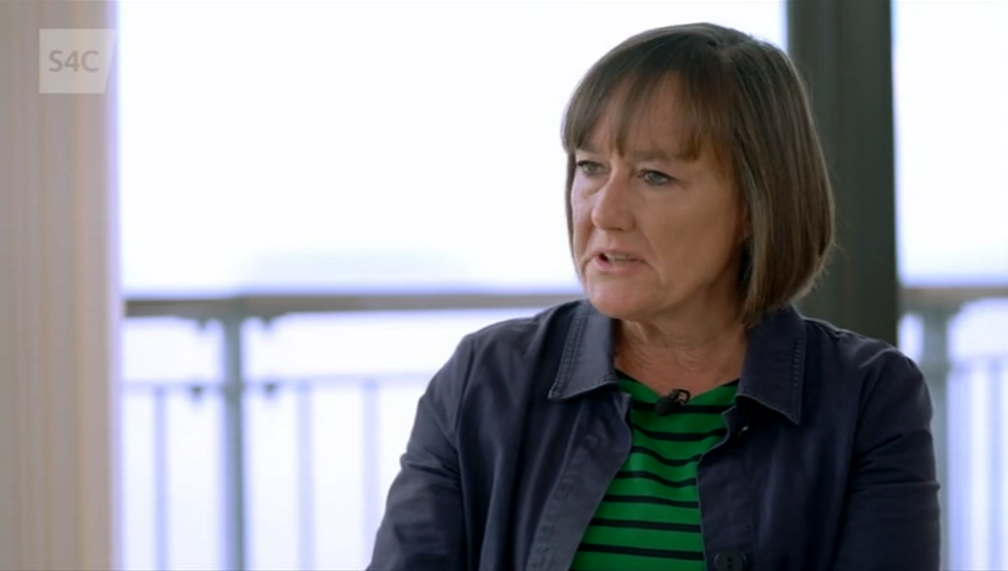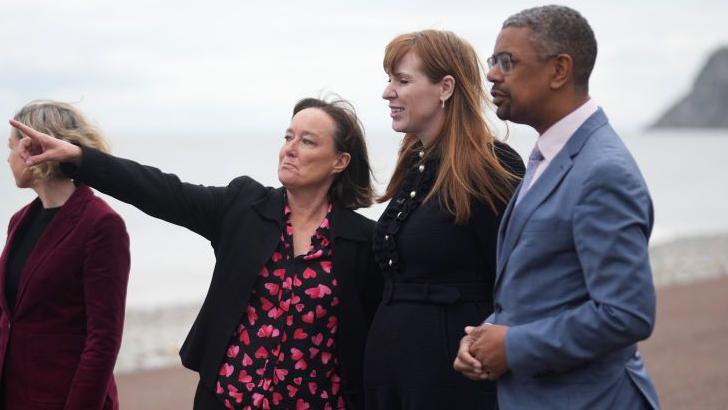Labour won't fiddle with police powers - Stevens

Jo Stevens is shadow Welsh secretary and the most senior Welsh Labour Westminster politician
- Published
Problems with crime are too urgent to begin "fiddling" by handing over the responsibility of police, courts and prisons to Wales, Welsh Labour's most senior Westminster politician has said.
Shadow Welsh secretary Jo Stevens said no one "would be forgiven for trying to rip up and reconstruct the Home Office and the Ministry of Justice at a time when crime is blighting our streets".
Labour's manifesto for the UK general election doesn't include support for the devolution of criminal justice, despite longstanding calls from the Labour-led Welsh government.
The Welsh Conservatives said Labour should be focused on health and education.
Plaid Cymru politician Heledd Fychan said Ms Stevens was laughing "in the face of Labour-commissioned reports which make the positive case for devolving policing and justice".
Meanwhile, First Minister Vaughan Gething has insisted he is not a marginalised figure.
What are Labour's manifesto plans for Wales?
- Published13 June 2024
Farage: Wales shows what a Labour government will do
- Published17 June 2024
Some areas need more immigration, says Plaid leader
- Published17 June 2024
Speaking to Catrin Haf Jones on S4C's Y Byd yn ei Le programme, Ms Stevens said the Welsh public was "concerned about crime and law and order, and I can understand why".
"When we have had 14 years of Conservative government and we've seen what they've done to the policing and criminal justice system, where we've had 20,000 police officers cut from the street.
"We have got victims of rape who are waiting a thousand days for their case to be heard.
"If you're looking through the lens of that through the criminal justice system you're going to want things to be fixed."
She warned against "fiddling around with structures and systems when there are urgent things to be done to fix things, which is what our people's priorities are in Wales."

Ms Stevens added: "Of course I trust my colleagues in Wales, but devolution is an agreement.
"It's not a demand. Devolution is not an event, it's a process."
Labour's manifesto said it would "explore" the devolution of probation, and "consider" the devolution of youth justice.
The cautious language was despite a report by former prime minister Gordon Brown which gave support to both proposals.
Defending the manifesto commitment, Ms Stevens said: "If you don't think about them before you do them you end up with a disaster."

Jo Stevens joined UK Labour deputy leader Angela Rayner and Welsh first minister Vaughan Gething to launch the Welsh Labour general election campaign in Llandudno on 24 May
Giving justice and policing powers to the Welsh government and the Senedd was backed by a former lord chief justice in a 2019 report commissioned by the Welsh government.
Lord John Thomas of Cwmgiedd had said the split of responsibilities between Westminster and Cardiff "has created pointless complexity, confusion and incoherence in justice and policing in Wales".
A further independent commission backed the devolution of policing.
But in response to it, Ms Stevens said back in January that Labour would be focusing at the next election on "the things that matter".
One of the commission's co-chairs, Laura McAllister, said on X, external: "Benefits of devolving police, probation, criminal justice have already been thoroughly and properly researched and evidenced.
"So, it's insulting to talk about 'exploring' and 'considering'."
She questioned whether "anyone" from Welsh Labour "have even an ounce of input" into the manifesto.
'Far from marginalised'
In the Senedd on Tuesday, First Minister Vaughan Gething denied that he is a marginalised figure in the Labour Party.
The first minister faced criticism from opposition politicians in the Senedd over his party’s UK manifesto commitments.
Welsh Conservative Senedd leader Andrew RT Davies claimed that comments by Jo Stevens in her interview with S4C on Monday night showed that Mr Gething “will be a marginal figure”, citing the absence of a commitment to electrify the north Wales mainline.
Quoting Taylor Swift, who is performing in Cardiff on Tuesday, Mr Gething told Mr Davies: “You need to calm down."
“I think you'll find that there is a Welsh Labour leader who is far from a marginalised figure.”
Mr Gething said he expects “we will invest more in rail services across north Wales”, and accused the Conservatives of proposing a “direct attack on devolution” in promising to roll back the 20mph speed limit and a Welsh trade union law.
Plaid Cymru’s Heledd Fychan said the language on structural funds in the manifesto – where Labour vows to restore decision making to “representatives” of Wales was “extremely woolly”.
“It seems to us very clear that Westminster will continue to control Wales’ post-Brexit cash – a power grab straight from the Tory playbook.”
Mr Gething said the manifesto “could not be clearer” in saying that Labour would “restore decision-making” over the allocation of structural funds".
He said he was “confident” the Welsh Labour government would secure the devolution of youth justice and probation – both issues Labour has said it would consider or explore.
The Welsh Conservatives' Darren Millar said in response to Ms Stevens: “Talk of the devolution of further powers is yet another distraction from Labour.
“Instead of tinkering with our constitution, Labour should be focused on the mess they have made in our NHS, where we have the longest waiting lists in the UK and in our education system where we had the steepest decline in PISA results.”
Plaid Cymru's Heledd Fychan said Ms Stevens' "insistence that devolving justice amounts only to fiddling around with structures and systems laughs in the face of Labour commissioned reports which make the positive case for devolving policing and justice.
"The interview displayed nothing short of a patronising and contemptuous attitude towards Wales by Keir Starmer’s top team."
Welsh Liberal Democrat leader Jane Dodds said Ms Stevens attitude showed "Wales will merely be an afterthought for an incoming Labour government".
"How is Wales ever meant to receive the investment needed to grow its own economy successfully if Labour cannot commit to things as basic as giving Wales its fair share of HS2 funding or electrifying the north coast mainline?"
A spokesman for Reform UK said the party "objects to any further devolution of powers until the Senedd can improve the performance of the public services it has had stewardship of since 1999".
If you would like to hear more about election issues in Wales and get the chance to have your say you can sign up to the BBC's live audience programmes here.